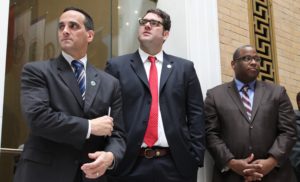
From left: Somerville Mayor Joe Curtatone, state Rep. Mike Connolly and former Boston City Councilor Tito Jackson at the State House in 2017. Photo courtesy of State House News Service.
In a lengthy note posted to his official Facebook page, Somerville Mayor Joe Curtatone came out in favor of rent control bills in the state legislature positioned by progressive legislators as an essential part of any deal to pass Gov. Charlie Baker’s proposed housing production bill. Curtatone, who is emerging as a leading progressive figure in state politics, added that his city would be putting together its own rent control proposal.
The move comes a day before Baker and several former housing secretaries are scheduled to push for the bill at a press conference this afternoon.
“Rent stabilization by itself will not solve the overall affordability problem,” Curtatone wrote. “That will require bold changes to state and local zoning that allow us to build the housing units our region needs. Yet that takes time, and people who are getting displaced by the crushing weight of housing costs don’t have the luxury to wait. People and families who rent need help today. Rent stabilization will help more people stay in their homes while we fix a broken system.”
Baker’s bill would lower the threshold for zoning changes from a two-thirds majority of the relevant municipal body to a simple majority. The bill’s backers say it would help dismantle a “paper wall” of zoning regulations that prevent new multifamily construction, which they say is kept in place by vocal minorities in many towns throughout the state. The bill would also help the many projects that need zoning relief move forward in the face of NIMBY opposition, the Baker administration says.
While Baker’s bill has the backing of the commercial real estate industry, some affordable housing advocates and the association representing the state’s 351 town and city governments, other housing advocates and leftist legislators say the bill won’t do enough to help renters at risk of displacement from both the state’s red-hot rental market and changing or gentrifying neighborhoods. A package of progressive counter-proposals, touted by Cambridge Rep. Mike Connolly and Boston Rep. Nika Elugardo, would let towns and cities establish rent control measures, eviction restrictions, require multifamily zoning near transit nodes and a $1 billion bond for affordable housing construction.
While many academics and real estate industry representatives have rejected rent control as a drag on housing production, Curtatone said his city planned to put together a rent control proposal soon “in anticipation of Beacon Hill taking action” on the concept, and planned to lobby other municipal leaders to back the idea.
“I want to be clear, I’m not talking about the 20th century form of rent control that caused neighborhoods to deteriorate by making it impossible for property owners to recoup their investments. I’m talking about a 21st century rent stabilization that gives cost certainty to both renters and small property owners,” he wrote. “Together we can keep increases reasonable, we can stop predatory rent hikes and we can do this while respecting the investments of small property owners. There is a fairer way, a better way for people to live in this community.”
In response, the CEO of the state’s commercial real estate trade association noted Massachusetts’ last rent control legislation reduced rental housing supply, but said it hoped to help solve the state’s housing crisis in a “practical and equitable way.”
“The voters of Massachusetts rejected rent control because it actually reduced the overall supply of rental housing – the opposite of what we need right now,” said Tamara Small, CEO of NAIOP-MA. “In today’s housing crisis, NAIOP is proud to stand with Mayor Curtatone in supporting the Housing Choice Bill – which addresses some of the most significant barriers to housing production in the commonwealth. Whether it’s senior housing in Lynnfield or multifamily housing in Salem, countless units of housing are never built because of the need for a supermajority vote. Any successful housing development requires a partnership between the developer and the community to ensure that the projects address local needs, and we look forward to continuing our work with Mayor Curtatone and others to solve this housing crisis in a practical and equitable way.”




 |
| 

